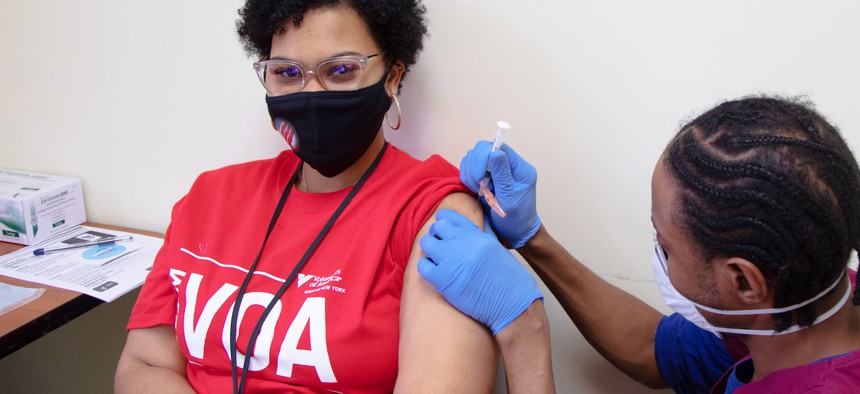New York City nonprofits become COVID-19 vaccine educators

Volunteers of America-Greater New York staff member receives her first dose of the COVID-19 vaccine on-site. Volunteers of America-Greater New York
Last month, Grand Street Settlement, a social services nonprofit helping youth, families and older adults, had 250 doses of COVID-19 vaccine to inoculate residents of a New York City Housing Authority building housing mostly older adults on Manhattan’s Lower East Side, but it only succeeded in vaccinating a little more than half of residents.
“It was disappointing, because we had like 100-plus vaccines that weren’t used when you’re talking about low-income seniors, mainly Latino, African American, Asian, residing in public housing,” said Robert Cordero, executive director of Grand Street Settlement. “That’s a population we really want to make sure has access.”
The problem in that case wasn’t access to the vaccines, but hesitation to get inoculated. Anecdotally, Cordero said it seemed many wanted to wait and see others vaccinated first before making the decision themselves. Other factors have also led more people to be wary of the COVID-19 vaccines. Historical racism in health care institutions has led many people of color to be distrustful of the vaccines. Others have expressed concerns about the speed at which the vaccines were developed, or possible side effects they could experience.
In an effort to combat disparities in vaccine distribution, Grand Street Settlement has done two such pop-up clinics, and other human services nonprofits have co-hosted vaccinations on site for clients and staff over the past several weeks.
Fewer than 10% of residents in housing provided by Volunteers of America-Greater New York, an organization that operates residential programs for homeless people, veterans, older adults and others, have gotten vaccinated so far. The organization's president and CEO, Myung Lee, said having more options for on-site vaccination would make a big difference for older residents who are struggling to get appointments or are otherwise afraid to travel for fear of getting sick. “If the vaccines would come to them, that would be great,” Lee said, adding that the organization plans to host vaccinations on-site once a network of health centers it has coordinated with, Sun River Health, has enough supply.
The Fortune Society, an organization helping formerly incarcerated New Yorkers, partnered with the city Department of Health and Mental Hygiene to vaccinate its staff and clients in congregate settings. The group also provided a partnering nonprofit health center, Community Healthcare Network, list of qualifying staff who could be offered leftover doses. Now, the nonprofit is aiming to keep a similar list of clients who would be interested in getting vaccines.
Hesitancy remains a major obstacle, however. Early in the year, Grand Street Settlement surveyed its staff – about 80% of whom are now vaccine-eligible – and found close to half were unsure if they’d get inoculated. Most wanted to take a “wait-and-see” approach, while many others said they needed more information.
Educational forums have been a key way nonprofits have tried to reach out to people who remain hesitant. Volunteers of America-Greater New York has made marketing materials displaying staff who have been vaccinated to encourage others. The nonprofit also will host a town hall with a board member and staff member who each struggled with COVID-19 this year to urge participants to get their dose.
Ahead of its own vaccination event, the Fortune Society brought in a doctor to answer questions from clients and staff about the difference between the Pfizer and Moderna vaccines and possible side effects. “The more we can bring different individuals, different voices to come in and say, go ahead and ask me whatever questions you have – I think the repetition of that coming from multiple voices will also help us over the hump,” said Ann Travers, the nonprofit’s senior director of operations on health home care management.
Philanthropic organizations have also begun to fund education and outreach efforts. The Brooklyn Community Foundation, for example, has committed $250,000 to fund vaccine-related engagement in communities of color hard-hit by the coronavirus. “I think what's important about this funding, this quarter-million dollars, is that it's not as simple as, we're just going to make sure you get vaccinated, because I think the conversations run a little deeper,” said the foundation President and CEO Cecilia Clarke.